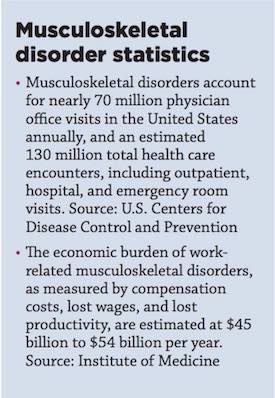Who is a member?
Our members are the local governments of Massachusetts and their elected and appointed leadership.
 Musculoskeletal disorders – injuries that affect the body’s movement system – include carpal tunnel syndrome, tendonitis, and muscle and tendon strain, but the most prevalent conditions translate into low back and neck pain.
Musculoskeletal disorders – injuries that affect the body’s movement system – include carpal tunnel syndrome, tendonitis, and muscle and tendon strain, but the most prevalent conditions translate into low back and neck pain.
Low back and neck pain are the first and fourth leading causes of disability, respectively, in the world. These conditions can easily become chronic problems, for which patients are often misdiagnosed and mistreated, thus leading the patient down a variety of paths in search of relief, sometimes unsuccessfully.
Musculoskeletal disorders often require costly MRI scans and x-rays that can be misleading, resulting in treatments and surgeries that may provide only temporary or no relief for the patient. Municipal managers see this reality in their spiking health care and workers’ compensation costs, which often lead to greater lost time and lost productivity.
In the United States, low back and neck pain are among the top 10 most expensive disease treatments. According to a January 2018 article on drugs.com, “Almost everyone experiences some form of musculoskeletal pain during their lifetime, and necks and backs are certainly at the top of the list.” In 2013, personal health care spending for this group totaled $88 billion in the United States, according to a 2016 report in the Journal of the American Medical Association.
The U.S. Centers for Disease Control and Prevention notes on its website that musculoskeletal disorders are associated with high “so-called indirect costs to employers such as absenteeism, lost productivity, and increased health care, disability, and workers’ compensation costs. MSD cases are more severe than the average nonfatal injury or illness.” These added costs are estimated to be two to three times the direct medical costs.
MSDs are reflected in rising health care costs, and they can affect municipal budgets dramatically, so municipal managers are advised to seek ways to address these cost drivers.
MIIA has learned of an alternative therapy that provides pain relief quickly and effectively, from both a physical and financial outcome.
Mechanical Diagnosis and Therapy
One alternative approach for the management of spinal and extremity problems is Mechanical Diagnosis and Therapy. MDT is a reliable and proven process for the assessment and treatment of musculoskeletal conditions that encourages active patient involvement and participation in the management of their complaint. This treatment is usually provided by a licensed physical therapist or chiropractor trained in MDT therapy.
Board-certified orthopedic surgeon Ron Donelson abandoned surgery altogether after being introduced to MDT through the McKenzie Institute International of New Zealand. Donelson now promotes MDT because it more accurately diagnoses MSDs, helps patients feel better more quickly, and reduces costs.
“MDT therapy is such a sensible approach to the treatment of low back and neck pain,” says Donelson. “And it can, in many cases, rapidly cause a patient’s pain to disappear. I think for some folks in the medical field, conceptually, this is just too simple.
“As surgeons, we’re trained to perform surgery,” he adds. “And certainly in some cases surgery is warranted and necessary for badly herniated disks and other non-reversible conditions. But in a large percentage of cases, we can treat these painful conditions with a series of easy-to-do movements, stretches, etc., that help correct the underlying MSD, providing full pain relief with a return to full activity. … Most patients’ MSDs are easily corrected if the right mechanical intervention is discovered during the MDT assessment.”
“The Price of Excess,” a 2008 article by PricewaterhouseCoopers, estimates that wasteful spending in the health system is 54.5 percent, with the biggest areas of excess being redundant, inappropriate or unnecessary tests and procedures, followed by inefficient health care administration.
Donelson notes that “MDT care, because it helps so many people, can reduce costs by eliminating costly visits for therapies that just aren’t working, as well as avoiding a large percentage of MRIs, injections, and spine surgeries.”
MIIA is partnering with Integrated Mechanical Care, a Florida-based company that offers clinical services based on MDT for most musculoskeletal solutions, to create an industry-leading pilot program for MIIA member employees that will bring high-value care. For every 300 musculoskeletal disorder cases, MIIA anticipates a 25 percent savings over traditional treatments.
MIIA will provide an update on the pilot program in a future issue of The Beacon and let interested members know how they can participate.